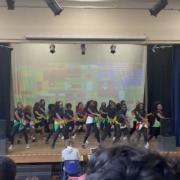
The 7:27 train to Charing Cross from Orpington was packed with people in colourful sports gear heading to the famous London Marathon. With the clock ticking to the start of the marathon, all the excited runners and spectators were travelling to the start point of the race, but I was actually going to the finish line. Ready in my new uniform, I watched the buzzing atmosphere around me, wondering about the amazing day ahead.
Last weekend, I had the opportunity to work as one of the twelve-thousand St John Ambulance volunteers, working to help runners in need of first aid and medical treatment throughout the marathon course. This was my first duty and a big one. I was a cadet observer, assigned as part of the Sidcup Unit.
The day began early at our treatment centre 8.10 in the south-west corner of Horse Guards Parade as various equipment was prepped and we were briefed by the treatment centre manager. During the briefing, we were introduced to the doctors, nurses and paramedics from different St Johns units as well as physiotherapists who had come specifically for the marathon. As this was my first duty with St Johns, I didn’t know what to expect or what I would be doing. I was assigned to work as part of the response team along with 3 other members. Our main duty was to rush to the patients in need of help especially those who had collapsed, to do basic first aid before bringing them to the treatment tent if needed.
Positioned extremely close to the finish line, we were to expect many runners coming to the centre after finishing the marathon…but we had to wait a few hours until runners actually finished!
While we were waiting for the runners to cross the finish line, we had a quick bite in the wonderful weather. Around 1 o’clock as the sun began to boil overhead, the first few patients filtered in. Fairly quickly, our response unit was being called out to runners near the finish line who needed help.
Each time we were called out, our team had to push the stretcher and carry the bags containing various first aid equipment. Experienced first aiders would talk to the patients and check vitals, while others prepared the stretcher. At the treatment centre, the triage team sent patients to majors or minors depending on the severity. Filling the patient response form for the first time, I was very nervous because I had no idea if I was filling it correctly but after a few I became confident.
From 2 to 6 o’clock, we worked hard as the tent was constantly taking in more patients. I was asked to stand down from duty around 6:30 pm. Our team was in fact commended by Crystal Palace Unit manager and National Youth Lead.
Although tiring, it was a great experience putting into practise what I have learned in my weekly cadet training. I learnt how to work together in a team, to think on the feet under pressure and have made some new friends. It was most rewarding to see the sigh of relief in the patients face when they left the tent. These were people who we took to the tent, with so much pain and agony only a couple of hours ago. I am very inspired and have realised that first aid skills are extremely important. I will be working towards gaining these skills and of course, looking forward to my next duty!
“There are things known and there are things unknown, and in between are the doors of perception.” - Aldous Huxley. Sunday 22nd April 2018 was a massive door opener that changed my perception.



























